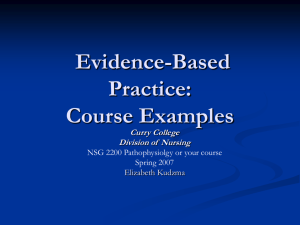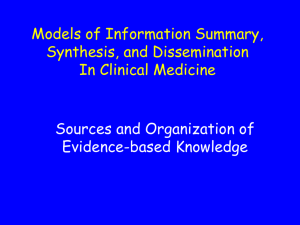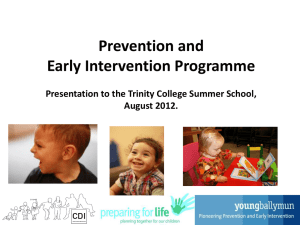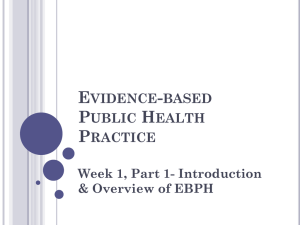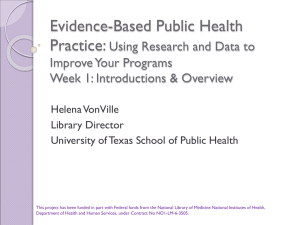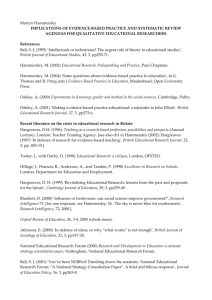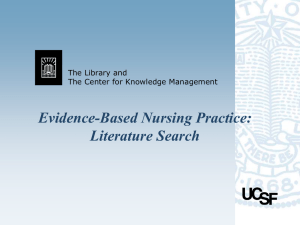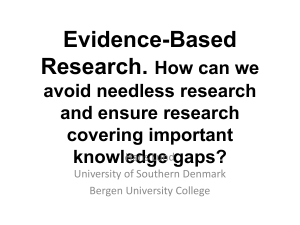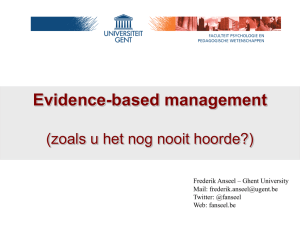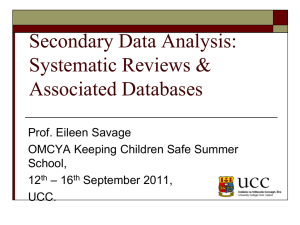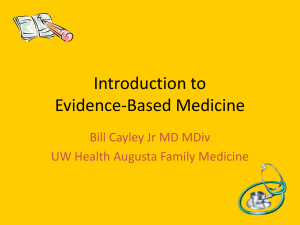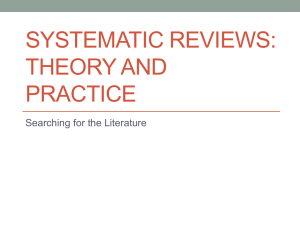Evidence-Based Practice
advertisement
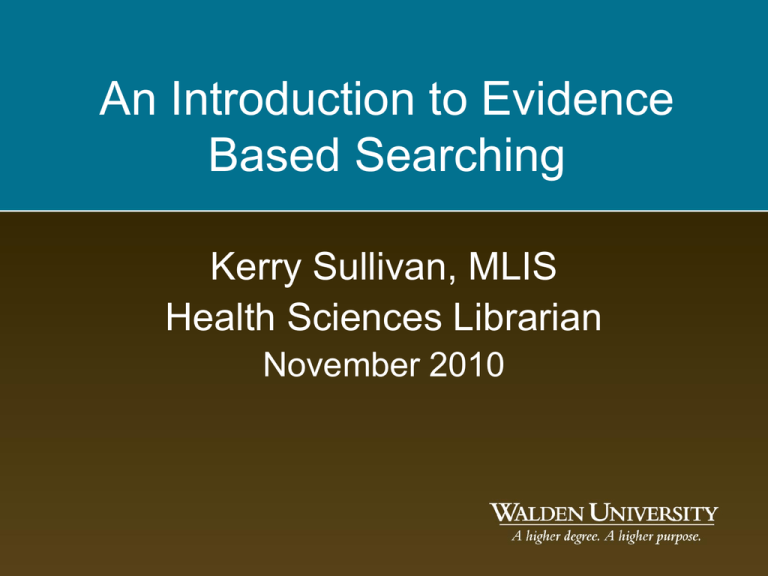
An Introduction to Evidence Based Searching Kerry Sullivan, MLIS Health Sciences Librarian November 2010 • Your hosts – Kerry Sullivan – Michelle Hajder QUESTIONS? – We will have time for Q&A at the end of the session – Expand the Questions window in the GoToWebinar module (usually on the right) and type in your questions for the presenters 2 GoToWebinar Control Panel 3 Evidence-Based Medicine (EBM) is defined as: "The conscientious, explicit and judicious use of current best evidence in making decisions about the care of individual patients.“ – Sackett, D. L., Rosenberg, W. M. C., Gray, J. A. M., Haynes, R. B., & Richardson, W. S. (1996). Evidence based medicine: What it is and what it isn't. British Medical Journal, 312(7023), 71-72. The Institute of Medicine (IOM) defines “Evidence-Based Practice" as a combination of the following three factors: (1) best research evidence, (2) best clinical experience, and (3) consistent with patient values – (IOM, 2001; http://www.iom.edu/) Evidence-Based Health Services Management is the "systematic application of the best available evidence to the evaluation of managerial strategies for improving the performance of health services organizations.“ – Kovner, A. R., & Rundall, T. G. (2006). Evidence-based management reconsidered. Frontiers of health services management, 22(3), 3-22. Evidence-Based Nursing (EBN) is defined as: "the application of valid, relevant, research-based information in nurse decision-making...used alongside our knowledge of our patients (their symptoms, diagnoses, and expressed preferences) and the context in which the decision is taking place (including the care setting and available resources), and in processing this information we use our expertise and judgement." – Cullum, N. (2008). Evidence-based nursing: An introduction. Oxford: Malden, MA: Blackwell Pub./BMJ Journals/RCN Pub. 1. Research 2. Clinician knowledge 3. Patient needs Formulating the Question • Defining a clinical question by the specific patient and problem lends itself to effectively finding relevant evidence. • EBP begins and ends with the patient. Clinical Question Anatomy PICO PICO is a mnemonic that helps one remember the key components of a well focused question. PICO • P = Patient, Population or Problem • I = Intervention, Prognostic Factor, or Exposure • C = Comparison (if there is one) • O = Outcome Our clinical question • Do BMI screenings in schools prevent diabetes in children? PICO • • • • P = School age children I = BMI testing in schools C = None O = Diabetes prevention Search Terms & Strategy • Keywords/Subjects – Schools AND BMI AND Diabetes Limits: children and highest levels of evidence • Resources – Library Databases: MEDLINE, CINAHL, Cochrane, etc. – Web Based: AHRQ, National Guideline Clearinghouse, TRIP Filtered Resources Highest Levels of Evidence • Systematic Reviews & Meta-Analysis – Cochrane Database of Systematic Reviews – Database of Abstracts of Reviews of Effects (DARE) Critically Appraised Topics • Evidence Synthesis – Evidence Based Resources from Joanna Briggs Institute – Annual Reviews – National Guideline Clearinghouse • http://www.guideline.gov – AHRQ Evidence Based Practice • Agency for Healthcare Research & Quality • http://www.ahrq.gov/ Unfiltered Resources • MEDLINE with Full Text • CINAHL Plus with Full Text • PsycINFO MEDLINE • Publication types: Clinical trials (all), RCTs, CCT, Meta-Analysis, Reviews • Clinical Queries: Therapy, Diagnosis, Prognosis, Reviews, Etiology, etc. • Population limits: Age, Gender, Human/Animal CINAHL • Publication types: Clinical Trials, Practice Guidelines, Systematic Review • Clinical Queries: Therapy, Prognosis, Review, Qualitative or Causation • Population limits: Age, Gender, Inpatients • Check limits: Evidence-Based Practice PsycINFO • Methodology: Systematic Review, MetaAnalysis, Treatment Outcome/Clinical Trial, Qualitative or Quantitative study • Population limits: Age Groups & Population Group Trip Database Turning Research Into Practice http://www.tripdatabase.com Point-of-Care Products • UpToDate http://www.uptodate.com/ • Dynamed http://www.ebscohost.com/dynamed • FirstConsult http://www.mdconsult.com • eMedicine http://www.emedicine.medscape.com Questions? Thank you! ASK – A – LIBRARIAN library@waldenu.edu 800-930-0914
